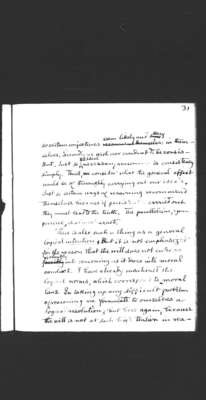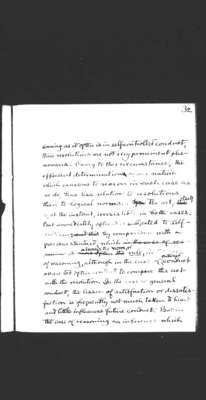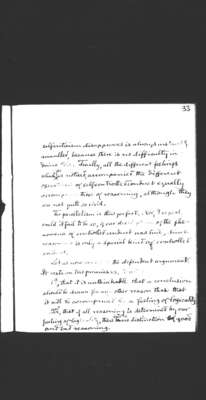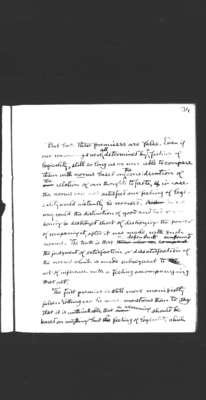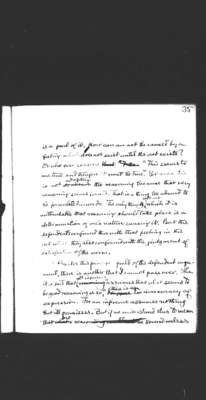Pages
36
31
so certain conjectures seem likely and easy in themselves. Secondly we wish our conduct to be consistent. Just so, the ideal necessary reasoning is consistency simply. Third, we consider what the general effect would be of throughly carrying out our ideals. Just so certain ways of reasoning recommend themselves became if persistently carried out they must lead to the truth. The parallelism, you percieve, is almost exact.
There is also such a thing a general logical intention. But it is not emphasized for the reason that the will does not enter so violently into reasoning as it does into moral conduct. I have already mentioned the logical norms, which corresponds to moral laws. In taking up any difficult problem of reasoning we formulate to ourselves a logical resolution; but here again, because the will is not at such high tension in rea-
37
32
oning as it often is in selfcontrolled conduct, these resolutions are not very prominent phenomena. Owing to this circumstance, the efficient determination of our nature which causes us to reason in each case as we do, has less relation to resolutions than to logical norms. The act itself is, at the instant, irresistible in both cases. But immediately after it is subjected to self-criticism, by comparison with a previous standard, which is always the norm, or rule, in the case of reasoning, although in the case of outward conduct no are often content to compare the act with the resolution. In the case of general conduct, the lesson of satisfaction or dissatisfaction is frequently not much taken to heart and little influences future conduct. But in the case of reasoning an inference which
38
33
self criticism disapproves is always instantly annulled, because there is no diffienlty in doing this. Finally, all the different feelings which as we noticed, accompanied the different operations of self controlled conduct equally accompany those of reasoning, although they are not quite so vivid.
The parallelism is thus perfect. Nor, I repeat could it fail to be so, if our description of the phenomena of controlled conduct was true, since reasoning is only a special kind of controlled conduct.
Let us now consider the defendent argument. It rests on two premisses, to wit:
1st, that it is unthinkable that a conclusion should be drawn for any other reason than that it will be accompanied by a feeling of logicality.
2nd, that if all reasoning is determined by our feeling od logicality, there can be no distinction of good and bad reasoning.
39
34
But both these premisses are false. Even if our reasonings were all determined by a feeling of logicality, still so long as we were able to compare them with norms based on the consideration of the relation of our thoughts to facts, in case the norms were not satisfied our feeling of logicality would instantly be reversed. In no way could the distinction of good and bad reasoning be destroyed short of destroying the power of comparing it, after it was made with such norms. The truth is that the defendents confound the judgment of satisfaction or dissactisfaction of the norms which is made subsequent to act of inference with a feeling accompaying that act.
The first premiss is still more manifestly false. Nothing can be more monstrous than to say that it is unthinkable that a reasoning shoud be based on anything but a feeling of logicality which
40
35
is a part of it. How can an act be caused by a feeling which does not exist until the act exists? Or who ever reasons "This seems to me true and therefore it must be true." Yet even this is not adopting the reasoning becasue that very reasoning seems sound. That is a thinf too absurd to be formulated in words. The only thing without which it is unthinkable that reasoning should take place is a determination of one's nature causing it. But the defendents confound this with that feeling in the act which they also confound with the judgment of satisfaction of the norm.
Besides this principle fault of the defendent argument, there is another that I cannot pass over. When it is said that all unference "assumes that what seems to be giid reasoning is so", there is an inaccuracy of expression. For an inference assumes nothing but its premisses. But if we understand this to mean that no reason be sound unless
